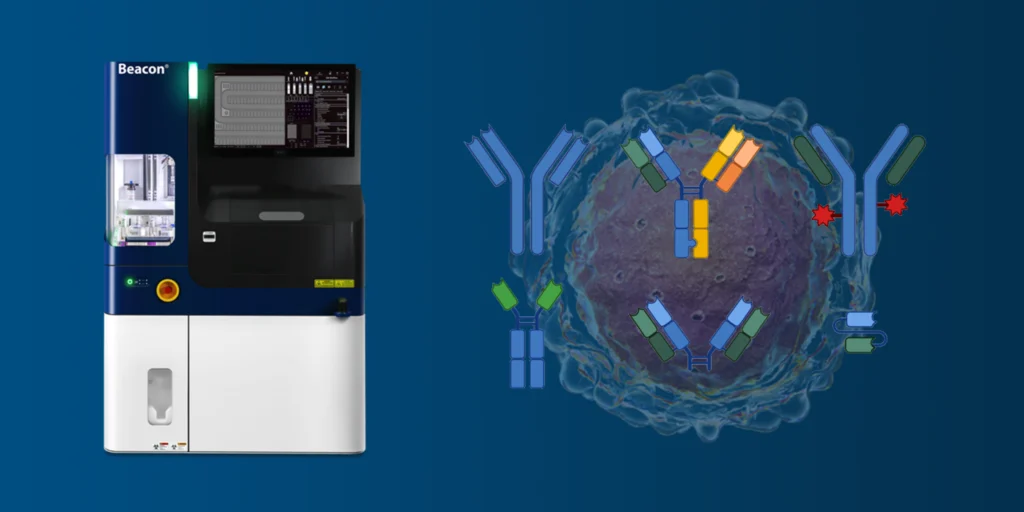Therapeutic antibodies are transforming medicine, offering precision treatments for cancer, autoimmune diseases, and infections. Recent advancements in antibody discovery and engineering have accelerated the pace of therapeutic development, focusing on approaches such as bispecific antibodies, antibody-drug conjugates (ADCs), and fully humanized antibodies. This blog dives into recent trends and how platforms like the Beacon optofluidic system are reshaping antibody discovery workflows.
Why Therapeutic Antibodies Are Game-Changers
Antibodies are the biopharmaceutical industry’s cornerstone, designed to target specific diseased cells while leaving healthy ones untouched. However, traditional antibody discovery methods are labor-intensive and time-consuming. In addition, as unmodified antibodies become less common, new antibody-based approaches are providing innovative ways to use existing antibody sequences and/or clinical safety profiles to advance more effective therapies with lower costs and risks. Let’s explore recent advances that are revolutionizing this field.
Key Advances in Antibody Discovery
Bispecific Antibodies: Double the Targeting Power
Bispecific antibodies are engineered to bind two distinct antigens or epitopes simultaneously. This dual-targeting ability has shown immense potential in oncology, where bispecific antibodies can simultaneously engage cancer cells and T cells, enhancing immune-mediated cytotoxicity. For example, the bi-specific T cell engager (BiTE) Blinatumomab has demonstrated clinical efficacy in treating acute lymphoblastic leukemia (ALL) (Yu et al., 2017).
Antibody-Drug Conjugates (ADCs): Targeted Precision Therapy
ADCs combine the specificity of antibodies with the cytotoxicity of small-molecule drugs. By targeting specific antigens on tumor cells, ADCs deliver potent therapeutic agents directly to the site of action, minimizing off-target effects. Notable advancements include the FDA approval of drugs like Enhertu and Polivy, which use optimized linkers and payloads to improve therapeutic efficacy (Su et al., 2021).
Fully Human Antibodies: Improved Compatibility
Advances in transgenic animal models, phage display libraries, and computational design have facilitated the production of humanized and fully human antibodies, reducing immunogenicity and enhancing therapeutic compatibility (Almagro et al., 2018).
AI in Antibody Discovery and Engineering: Smarter, Faster, Better
AI is transforming antibody discovery and engineering by enabling the prediction of antigen-antibody interactions, de novo design of antibody candidates, and optimization of affinity and stability. Machine learning models analyze vast datasets from high-throughput screens, identifying lead candidates with improved speed and precision (Makowski et al., 2023).
Single-Cell Technology: Unprecedented Precision
Modern single-cell analysis platforms allow for rapid screening of tens of thousands of antibody-producing B cells, accelerating the discovery of high-affinity and high-specificity antibodies (Leung et al., 2020).
Trends Reshaping the Industry
Synthetic and Modular Antibodies: Advances in synthetic biology have enabled the creation of modular antibody formats, such as nanobodies and single-chain variable fragments (scFvs). These smaller constructs exhibit improved tissue penetration and manufacturability, expanding their therapeutic applications (Asaadi et al.,2021).
Expanded Therapeutic Targets: The range of antibody-based therapeutics is expanding beyond cancer to include neurodegenerative diseases, infectious diseases, and cardiovascular conditions. This shift is driven by advancements in target identification and validation tools (Lee et al., 2018).
Personalized Antibody Therapies: With the growing emphasis on precision medicine, personalized therapeutic antibodies tailored to individual patients’ genetic and disease profiles are becoming a reality. Biomarker-driven approaches are integral to this trend (An, 2010).
The Role of the Beacon Optofluidic Platform in Therapeutic Antibody Discovery
The Beacon Optofluidic Platform, with its function-first, high-throughput single B cell characterization, maximizes the success of your antibody campaigns. Its key contributions include:
Single-Cell Characterization and Analysis: The Beacon platform rapidly isolates and characterizes individual antibody-producing cells, allowing researchers to identify high-performing clones with unprecedented precision. This capability significantly reduces the time required to identify lead candidates.
High-Throughput Functional Assays: The Beacon platform integrates multiple functional assays, such as binding affinity and epitope specificity, directly into the single-cell workflow. This reduces the need for labor-intensive downstream screening.
Data-Driven Decision Making: By integrating real-time data capture with advanced analytics, the Beacon platform empowers researchers to make data-driven decisions, improving reproducibility and accelerating development timelines.
References
- [1] Yu, S., et al. (2017). Recent advances of bispecific antibodies in solid tumors. Journal of Hematology & Oncology.
- [2] Su, Z., et al. (2021). Antibody–drug conjugates: Recent advances in linker chemistry. Acta Pharmaceutica Sinica B.
- [3] Almagro, J. C., et al. (2018). Progress and Challenges in the Design and Clinical Development of Antibodies for Cancer Therapy. Frontiers in Immunology.
- [4] Makowski, E. K., et al. (2023 Simplifying complex antibody engineering using machine learning. Cell Systems.
- [5] Leung, D., et al. (2020). Antibody conjugates: Recent advances and future directions. Antibodies.
- [6] Asaadi Y., et al. (2021). A comprehensive comparison between camelid nanobodies and single chain variable fragments. Biomarker Research.
- [7] Lee, A., et al. (2018). Recent progress in therapeutic antibodies for cancer immunotherapy. Current Opinion in Chemical Biology.
- [8] An, Z. (2010). Monoclonal antibodies: A proven and rapidly expanding therapeutic modality for human diseases. Protein & Cell.


